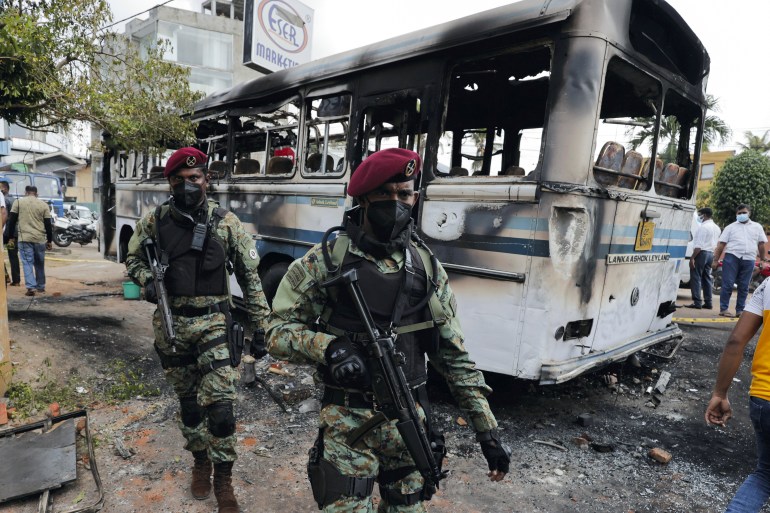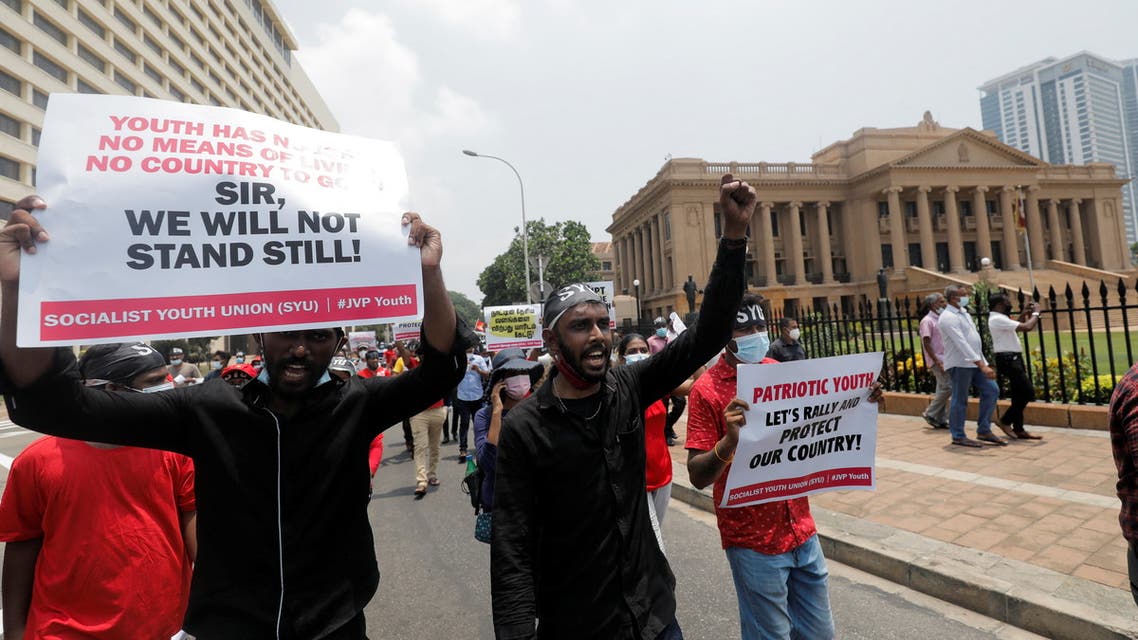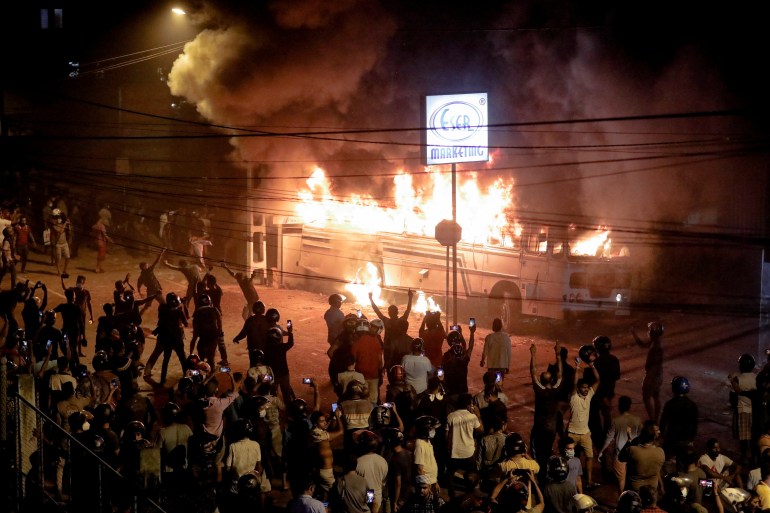UPDATED
Sri Lanka declares state of emergency as protests spread

Sri Lanka Financial Crisis: Violent Protests In Colombo Amid Power Cuts, Shortage Of Fuel And Food
Hundreds of Sri Lankans on Thursday night gathered outside the private residence of Sri Lankan president in a Colombo suburb to protest against their everyday hardships because of the country's ongoing worst financial crisis. Sri Lanka has an acute shortage of foreign exchange, which has led to a shortage of fuel and food. Prices of all commodities have increased. The country is also facing up to 13 hours of power cuts everyday as there is no fuel to burn to produce thermal power. Protesters on Thursday burnt military and police vehicles. Security personnel fired tear gas shells and water cannons to disperse the protesters. Dozens of people were arrested.

A Sri Lankan man shouts anti government slogans during a protest outside Sri Lankan president's private residence on the outskirts of Colombo, Sri Lanka. Sri Lanka police fired tear gas and a water canon to disperse several hundred people protesting near the private residence of the country’s president. The people had gathered Thursday to protest the economic hardships faced by them.

Sri Lankans watch after setting a bus on fire during a protest outside Sri Lankan president's private residence on the outskirts of Colombo, Sri Lanka. Sri Lanka police fired tear gas and a water canon to disperse several hundred people protesting near the private residence of the country’s president. The people had gathered Thursday to protest the economic hardships faced by them. Protestors shouted slogans condemning the long power cuts and shortages of essentials.

Sri Lankan army soldiers secure surroundings around Sri Lankan president's private residence during a protest on the outskirts of Colombo, Sri Lanka. Sri Lanka police fired tear gas and a water canon to disperse several hundred people protesting near the private residence of the country’s president. The people had gathered to protest the economic hardships faced by them. Protestors shouted slogans condemning the long power cuts and shortages of essentials.

Sri Lankans watch clashes between protesters and security officers outside Sri Lankan president's private residence on the outskirts of Colombo, Sri Lanka. Sri Lanka police fired tear gas and a water canon to disperse several hundred people protesting near the private residence of the country’s president. The people had gathered Thursday to protest the economic hardships faced by them. Protestors shouted slogans condemning the long power cuts and shortages of essentials.

Sri Lankan police officers carry an injured officer during a protest out side Sri Lankan president's private residence on the outskirts of Colombo, Sri Lanka. Sri Lanka police fired tear gas and a water canon to disperse several hundred people protesting near the private residence of the country’s president. The people had gathered Thursday to protest the economic hardships faced by them. Protestors shouted slogans condemning the long power cuts and shortages of essentials.

Police uses water canon to disperse protesters during a protest outside Sri Lankan president's private residence on the outskirts of Colombo, Sri Lanka. Sri Lanka police fired tear gas and a water canon to disperse several hundred people protesting near the private residence of the country’s president. The people had gathered Thursday to protest the economic hardships faced by them. Protestors shouted slogans condemning the long power cuts and shortages of essentials.

Sri Lankan protestors riot outside Sri Lankan president's private residence on the outskirts of Colombo, Sri Lanka. Sri Lanka police fired tear gas and a water canon to disperse several hundred people protesting near the private residence of the country’s president. The people had gathered Thursday to protest the economic hardships faced by them.

Protesters run to take cover as police uses tear gas shells to disperse them during a protest outside Sri Lankan president's private residence on the outskirts of Colombo, Sri Lanka. Sri Lanka police fired tear gas and a water canon to disperse several hundred people protesting near the private residence of the country’s president. The people had gathered Thursday to protest the economic hardships faced by them. Protestors shouted slogans condemning the long power cuts and shortages of essentials.

Sri Lankans shout anti government slogans after setting a bus on fire during a protest outside Sri Lankan president's private residence on the outskirts of Colombo, Sri Lanka. Sri Lanka police fired tear gas and a water canon to disperse several hundred people protesting near the private residence of the country’s president. The people had gathered Thursday to protest the economic hardships faced by them. Protestors shouted slogans condemning the long power cuts and shortages of essentials.
Sri Lanka Warns Clashes at President’s Home Imperils Tourism
, Bloomberg News
(Bloomberg) -- Sri Lanka’s government said the protesters’ violent clashes with police outside President Gotabaya Rajapaksa’s home were a threat to the revival of the tourism sector, appealing for calm amid widespread anger over surging costs and power cuts stemming from a foreign exchange crisis.
“Today we have a big problem with foreign exchange. One solution is to get more tourists to come. I believe the opposition wants to create a crisis and stop tourists,” Tourism Minister Prasanna Ranatunga said in a media conference to address the clashes. “In about six to seven months, we think the forex problem will begin to be resolved.”
The government was counting on a restart of tourism to build up its foreign exchange reserves after two years of Covid lockdowns at home and disruptions to global leisure travel. The sector generally accounts for about 5% of the economy.
However, tensions are on the rise after protesters on late Thursday surged past the barricades surrounding Rajapaksa’s residence and pelted stones, prompting police to fire tear gas and water cannons. Local television channels and social media videos showed the crowd screaming “Go home Gota” and demanding the resignation of Rajapaksa and his family from government.
Rajapaksa’s elder brother Mahinda serves as prime minister while Basil, the youngest, holds the finance portfolio. The eldest Rajapaksa brother Chamal controls the agriculture ministry while nephew Namal is the sports minister. These family members enjoy two-thirds majority support in parliament while the opposition remains divided. National elections will be held in 2023 at the earliest.
Stock trading was halted for the day after the bluechip index plunged 10% Friday.
Nearly 50 people were injured and protesters set fire to an army bus near the president’s home, the Daily Mirror reported. A curfew was imposed in several areas of Colombo and its suburbs, which was later lifted on Friday.
The president has not publicly commented on the clashes near his home although his office said in a statement that an organized group of extremists were among the protesters. Many of those who turned violent were arrested by the police.
The cabinet ministers at the Friday media conference echoed these comments, blaming political extremists for the clashes. “The security forces had to act, they had to stop people from walking into the president’s house,” Heath Minister Keheliya Rambukwella said.
Sri Lankans have taken to social media in recent days to criticize the Rajapaksa clan and call for people to gather in Colombo and the surrounding areas on Sunday afternoon to peacefully protest against the political situation in the country.
Rajapaksa’s government is grappling with debt obligations, limited foreign reserves and inflation which is the highest in Asia. People are queuing for hours for fuel and living with daily power cuts that stretch for more than half a day as supplies of diesel are running out and the government lacks the dollars to pay for shipments.
Sri Lanka Leader Ramps Up Spending in High-Risk Bid for Support
The government is seeking a loan from the International Monetary Fund while asking for bilateral aid from countries including China, India and Bangladesh. Sri Lanka has raised interest rates, devalued the rupee and reduced stock-trading hours in a bid to preserve electricity and foreign currency.
Sri Lanka, whose trade deficit doubled to $1.1 billion in December, had about $2.3 billion of foreign-exchange reserves in February and faces a $1 billion dollar bond repayment in July.
The IMF last month said Sri Lanka faces a “clear solvency problem” due to unsustainable debt levels, as well as persistent fiscal and balance-of-payments shorts.
(Updates throughout)
©2022 Bloomberg L.P.
Sri Lanka lifts curfew after violent protests over economic crisis

Members of Socialist Youth Union shout slogans against the Sri Lankan President Gotabaya Rajapaksa in front of the President's secretariat during a protest against the worsening economic crisis. (Reuters)
Reuters, Colombo
Published: 01 April ,2022
Police in Sri Lanka’s capital lifted a curfew on Friday after protests in which dozens of people were arrested and several policemen were hurt near the home of President Gotabaya Rajapaksa over his handling of an economic crisis.
Hundreds of protesters gathered near Rajapaksa’s residence in a Colombo suburb late on Thursday before police dispersed them with tear gas and water cannons, a Reuters witness said.
“We have arrested 54 people over the unrest last night. Several vehicles belonging to the army and police were burnt by the protesters, including two buses, one police jeep and several motorcycles,” a police spokesman, Senior Superintendent Nihal Thalduwa, told Reuters.
The island nation of 22 million people is in the midst of its worst economic crisis in years with rolling blackouts for up to 13 hours a day because the government does not have enough foreign exchange to pay for fuel imports.
Five policemen were injured and in hospital, Thalduwa said, adding there were no reports of injuries among the protesters.
“The main issue Sri Lanka is facing is a forex shortage and protests of this nature will hurt tourism and have economic consequences,” Sri Lanka’s tourism minister Prasanna Ranatunge told a press conference on Friday.
“Our stance is that people have the right to protest but it should be constructive. What happened yesterday was the opposite.”
Streets in the capital were quiet on Friday morning. Police combed through the wreckage of two burnt-out buses near Rajapaksa’s home, a Reuters witness said.
Trading on the country’s stock market was suspended for the third day in a row after the main blue-chip index fell 10 percent from the previous close.
Read more:
Sri Lanka to turn off streetlights to save electricity amid deepening economic crisis
Sri Lanka runs out of diesel, faces longest-ever blackout
Ten-hour power cuts in Sri Lanka as economic crisis worsens
Police in Sri Lanka’s capital lifted a curfew on Friday after protests in which dozens of people were arrested and several policemen were hurt near the home of President Gotabaya Rajapaksa over his handling of an economic crisis.
Hundreds of protesters gathered near Rajapaksa’s residence in a Colombo suburb late on Thursday before police dispersed them with tear gas and water cannons, a Reuters witness said.
“We have arrested 54 people over the unrest last night. Several vehicles belonging to the army and police were burnt by the protesters, including two buses, one police jeep and several motorcycles,” a police spokesman, Senior Superintendent Nihal Thalduwa, told Reuters.
The island nation of 22 million people is in the midst of its worst economic crisis in years with rolling blackouts for up to 13 hours a day because the government does not have enough foreign exchange to pay for fuel imports.
Five policemen were injured and in hospital, Thalduwa said, adding there were no reports of injuries among the protesters.
“The main issue Sri Lanka is facing is a forex shortage and protests of this nature will hurt tourism and have economic consequences,” Sri Lanka’s tourism minister Prasanna Ranatunge told a press conference on Friday.
“Our stance is that people have the right to protest but it should be constructive. What happened yesterday was the opposite.”
Streets in the capital were quiet on Friday morning. Police combed through the wreckage of two burnt-out buses near Rajapaksa’s home, a Reuters witness said.
Trading on the country’s stock market was suspended for the third day in a row after the main blue-chip index fell 10 percent from the previous close.
Read more:
Sri Lanka to turn off streetlights to save electricity amid deepening economic crisis
Sri Lanka runs out of diesel, faces longest-ever blackout
Ten-hour power cuts in Sri Lanka as economic crisis worsens
Curfew in Sri Lanka as protesters try to storm president’s house
Police impose overnight curfew in parts of the capital as protests against a dire economic crisis turn violent.









